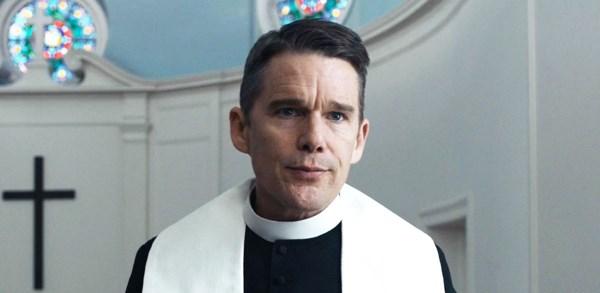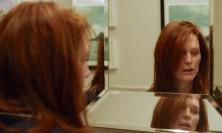First Reformed, set in present day New York, confronts us with universal themes and a crisis of priestly and personal faith reminiscent of Bernanos, Dostoyevsky and Graham Greene. Focused on Ernst Toller, the agonised pastor of a failing church on the heritage tourist trail, it is also a powerful critique of religious positions that are wholly inadequate in the face of the third millennium’s crucial ideological challenges.
Toller, played with bleak intensity by a career-best Ethan Hawke, is a former patriot and military chaplain whose ministry, marriage and entire world have come crashing down after the son he had urged to join the army is killed in the futility of the Iraq conflict. Abandoned by his wife and critically isolated by his own despair, his body, mind and faith are giving way simultaneously as he tries to drown his pain in alcohol. He goes through the motions with the few people who attend his church or visit as barely attentive tourists, and struggles to be present when Mary (Amanda Seyfried), a distressed expectant mother, asks for help with her depressed husband, Michael (Philip Ettinger). Toller approaches mildly in mug of tea and dog collar mode, only to meet a suicidal rage and despair that matches his own in an environmental activist so appalled by public and governmental indifference that he rejects the thought of bringing life into a dying world and can only resort to desperate measures. Confronted by the inadequacy of his own response when Mary persists in seeking strength and comfort from the Church, Toller has to face the emptiness of what he and the mega-church next to his own have to offer when confronted by human greed, ecological indifference and despair. The film spirals, together with Toller, into desolation pushed to insanity, illustrated by a pitiless landscape devoid of beauty or hope.
The names of the main characters are telling. Mary is determined to bring her child into a world that she knows is marked by pain and hopelessness. Seyfried’s wide-eyed prom queen looks are overlaid with just enough determination and resilience to avoid folksy optimism. She chooses life at every stage, and it is this choice that offers Toller an alternative to carrying out his planned apocalyptic dénouement. Michael sees himself as an avenging angel who has ultimately failed in his duty to guard and guide. His denunciation of humanity’s consumerist self-destruction is powerful, but he is unable either to drive the demons from paradise or to bear the thought of living in a fallen world. Toller’s first name is Ernst. Earnest he is, and confounded by his own honesty. He cannot live with the guilt of his unthinking acquiescence with the military-industrial project and its deathly result. Nor can he follow his senior pastor in colluding with environmentally corrupt big business in order to secure mega-congregations and financial survival for his church. He is devoid of meaningful spiritual answers and resorts to measures as futile as they are destructive. A bizarre magical-realist sequence worthy of Gabriel García Márquez emphasises the spiritual crisis within the characters as catastrophe looms over the world’s concrete future. Toller’s bishop is squelchily benign and comfortable but bewildered by his subordinate’s self-flagellating agonies. ‘You’re always in the garden’, he remarks, and certainly Gethsemane stalks Ernst’s every step. But Ernst has taken up Michael’s desperate question, ‘Will God forgive us?’ His Jesus appears unable to take away the sins of the world, so to this he has no answer.
Some critics have billed this uncompromising and challenging film as a reflection on the place of faith in the modern world, but if it is, it offers versions of faith and of the Church that are powerless to save. Ernst’s approach to Mary and Michael is kind, dutiful and anodyne. He is ultimately engulfed by their needs, unable to stand in the face of such pain. There are those today who are happy to accept the Church as a heritage theme park. While this may preserve historic buildings, it deprives them entirely of their original meaning and purpose even if, like Ernst’s Dutch Reformed church, they have played vital salvific and liberating roles in the past. The bishop has gone for survival at any price. He has a highly satisfying turnover and his church is now a successful business. But the legitimacy he has offered his sponsoring corporations hopelessly compromises his message and ministry. God has become a consumer product, offering cover to some distinctly ungodly patrons. The Creator has become a consumer idol in the process. Ernst at least attempts some kind of discernment, but lacking coherent tools for this, and blind to any other possibility, he falls back like Samson in Gaza on a ferocious zero option. The scene is scarcely bearable to watch and pushed into noisy irony by the hymn ‘Leaning on the Everlasting Arms’ that plays throughout. It is the revolution of tenderness that shows some hope of saving him, in an ending that feels somewhat fraudulent. The presentation of inadequate ecclesial and ideological responses is pitch-perfect, unflinching and decisive. It's hard to know how such a film could have ended satisfactorily, but that’s agnosticism for you.






